初中英语常用易混词汇辨析大全,
- 格式:doc
- 大小:4.83 MB
- 文档页数:9
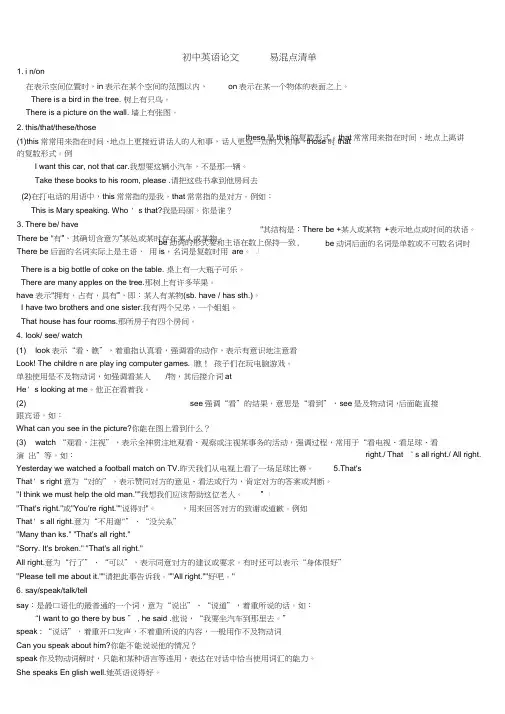
初中英语论文 易混点清单1. i n/on 在表示空间位置时,in 表示在某个空间的范围以内, on 表示在某一个物体的表面之上。
There is a bird in the tree. 树上有只鸟。
There is a picture on the wall. 墙上有张图。
2. this/that/these/those (1)this 常常用来指在时间、地点上更接近讲话人的人和事, 话人更远一点的人和事,those 时that 的复数形式。
例 I want this car, not that car.我想要这辆小汽车,不是那一辆。
Take these books to his room, please .请把这些书拿到他房间去 (2)在打电话的用语中,this 常常指的是我,that 常常指的是对方。
例如: This is Mary speaking. Who ' s that?我是玛丽。
你是谁?3. There be/ have There be "有”,其确切含意为”某处或某时存在某人或某物。
There be 后面的名词实际上是主语, 用is ,名词是复数时用 are 。
J these 是this 的复数形式。
that 常常用来指在时间、地点上离讲be 动词的形式要和主语在数上保持一致, J "其结构是:There be +某人或某物 +表示地点或时间的状语。
be 动词后面的名词是单数或不可数名词时There is a big bottle of coke on the table. 桌上有一大瓶子可乐。
There are many apples on the tree.那树上有许多苹果。
have 表示"拥有,占有,具有”,即:某人有某物(sb. have / has sth.)。
I have two brothers and one sister.我有两个兄弟,一个姐姐。
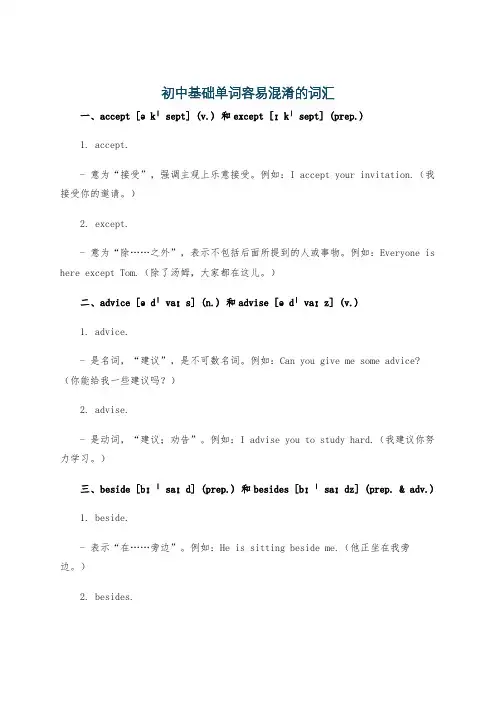
初中基础单词容易混淆的词汇一、accept [əkˈsept] (v.) 和except [ɪkˈsept] (prep.)1. accept.- 意为“接受”,强调主观上乐意接受。
例如:I accept your invitation.(我接受你的邀请。
)2. except.- 意为“除……之外”,表示不包括后面所提到的人或事物。
例如:Everyone is here except Tom.(除了汤姆,大家都在这儿。
)二、advice [ədˈvaɪs] (n.) 和advise [ədˈvaɪz] (v.)1. advice.- 是名词,“建议”,是不可数名词。
例如:Can you give me some advice?(你能给我一些建议吗?)2. advise.- 是动词,“建议;劝告”。
例如:I advise you to study hard.(我建议你努力学习。
)三、beside [bɪˈsaɪd] (prep.) 和besides [bɪˈsaɪdz] (prep. & adv.)1. beside.- 表示“在……旁边”。
例如:He is sitting beside me.(他正坐在我旁边。
)2. besides.- 作介词时,意为“除……之外(还有)”;作副词时,意为“而且;此外”。
例如:Besides English, we also learn French.(除了英语,我们还学法语。
);I don't like this dress. Besides, it's too expensive.(我不喜欢这条裙子。
而且,它太贵了。
)四、borrow [ˈbɒrəʊ] (v.) 和lend [lend] (v.)1. borrow.- 意为“借入”,常用搭配borrow sth. from sb.。
例如:I borrow a book from the library.(我从图书馆借了一本书。
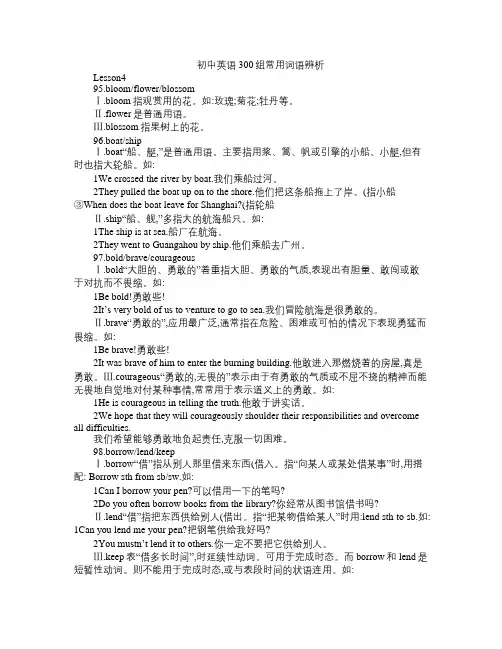
初中英语300组常用词语辨析Lesson495.bloom/flower/blossomⅠ.bloom指观赏用的花。
如:玫瑰;菊花;牡丹等。
Ⅱ.flower是普通用语。
Ⅲ.blossom指果树上的花。
96.boat/shipⅠ.boat“船、艇,”是普通用语。
主要指用浆、篙、帆或引擎的小船、小艇,但有时也指大轮船。
如:1We crossed the river by boat.我们乘船过河。
2They pulled the boat up on to the shore.他们把这条船拖上了岸。
(指小船③When does the boat leave for Shanghai?(指轮船Ⅱ.ship“船、舰,”多指大的航海船只。
如:1The ship is at sea.船厂在航海。
2They went to Guangahou by ship.他们乘船去广州。
97.bold/brave/courageousⅠ.bold“大胆的、勇敢的”着重指大胆、勇敢的气质,表现出有胆量、敢闯或敢于对抗而不畏缩。
如:1Be bold!勇敢些!2It’s very bold of us to v enture to go to sea.我们冒险航海是很勇敢的。
Ⅱ.brave“勇敢的”,应用最广泛,通常指在危险、困难或可怕的情况下表现勇猛而畏缩。
如:1Be brave!勇敢些!2It was brave of him to enter the burning building.他敢进入那燃烧着的房屋,真是勇敢。
Ⅲ.courageous“勇敢的,无畏的”表示由于有勇敢的气质或不屈不挠的精神而能无畏地自觉地对付某种事情,常常用于表示道义上的勇敢。
如:1He is courageous in telling the truth.他敢于讲实话。
2We hope that they will courageously shoulder their responsibilities and overcome all difficulties.我们希望能够勇敢地负起责任,克服一切困难。
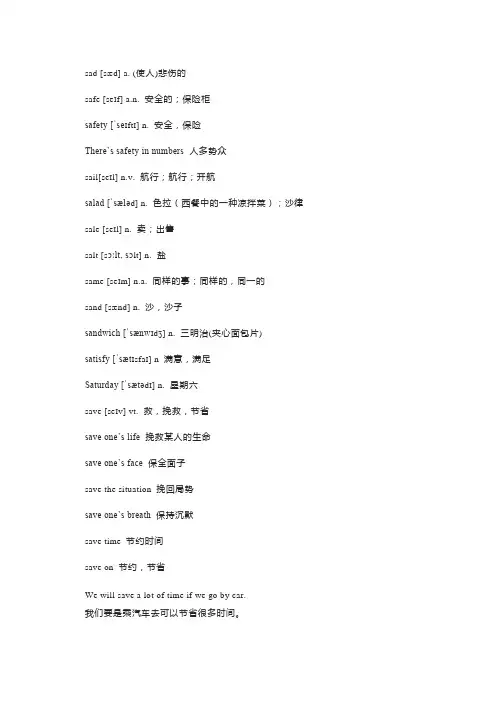
sad [sæd] a. (使人)悲伤的safe [seɪf] a.n. 安全的;保险柜safety [ˈseɪftɪ] n. 安全,保险There’s safety in numbers 人多势众sail[seɪl] n.v. 航行;航行;开航salad [ˈsæləd] n. 色拉(西餐中的一种凉拌菜);沙律sale [seɪl] n. 卖;出售salt [sɔːlt, sɔlt] n. 盐same [seɪm] n.a. 同样的事;同样的,同一的sand [sænd] n. 沙,沙子sandwich [ˈsænwɪdʒ] n. 三明治(夹心面包片)satisfy [ˈsætɪsfaɪ] n 满意,满足Saturday [ˈsætədɪ] n. 星期六save [seɪv] vt. 救,挽救,节省save one’s life 挽救某人的生命save one’s face 保全面子save the situation 挽回局势save one’s breath 保持沉默save time 节约时间save on 节约,节省We will save a lot of time if we go by car.我们要是乘汽车去可以节省很多时间。
say(said, said) [seɪ] vt. 说,讲go without saying 显而易见say to oneself 自言自语scarf[skɑːf] n. 领巾;围巾school [skuːl] n. 学校schoolbag['sku:lbæg] n. 书包science [ˈsaɪəns] n. 科学,自然科学scientist[ˈsaɪəntɪst] n. 科学家scissors [ˈsɪzəz] n. 剪刀score [skɔː(r)] n.&v. 得分;分数a score-keeper 记分员a score –sheet 记分单a score of 二十个screen [skriːn] n. 幕,荧光屏sea[siː] n. 海,海洋in the sea 在海里on the sea 在海滨by sea 乘船a sea of flames 一片火海search [sɜːtʃ] n.&v. 搜寻,搜查search for sb/sth 寻找某人/某物Rescue workers searched all night in the hope of finding more survivors.营救人员彻夜搜寻,希望找到更多的幸存者。

2019初中英语常用易混词汇辨析above/over/onacross/throughat all/ after all?few / a few / little / a littleago/ beforealone/ lonelyalready/ yetanswer/ replyarrive /reach/get toagree with/ agree on/ agree toa little/ a bitas/likeafter/inby the way/on the way/in the waybecause/because ofbe afraid that/be afraid ofbig/large/great/ hugebelow/underbetween/ among;another/ the other/ other/ others/ the others】as/ when/ while;borrow/ lendbring/ take/ fetch/ carrybeat/win》because/since/for"be made of / be made fromby/ with/ in:be used for/ be used as/ be used bybesides/exceptboth/ allbe anger with/ be angry aboutcatch a cold/have a coldcan/be able todo with/deal withdie/dead/dying/death@discover/inventelse/otherevery day/ everydayfamily/ home/housefinal/lastbe famous as/ be famous forforget/leaveforget to do sth./forget doing sth.for example/such asfast / quick/ quicklyget/turn/grow/ becomego to bed/go to sleep/fall asleep/ be asleephappen/take placehave been to/have gone to/have been in,hear/listenhow often/how soon/how long/how farhard/hardlyin the corner/at the corner/on the cornerhear sb. doing sth./ hear sb. do sth.hope/ wishif /whether·interesting/ interestedill/ sickin the tree/on the treein time/on timeinstead /instead ofin front of/ in the front ofin future / in the futurejoin/ take part inaloud/loud/ loudlyleave/ leave forlose / miss\look/ seemlook for/ findlook/ see/watch/read$maybe/may bemuch too/ too muchnear/nearlyneither/ noneno/noton/aboutone day/some dayput on/wear.point at/ point toplant/growproblem/ questionreceive/ acceptreal/ trueraise/risesee sb. doing sth./ see sb. do sth.spend/ take/ cost/paysince/ forso that/so…thatsound/voice/noisetall/highsay/speak/tell/ talksome/anythe number of/a number oftry to do/ try doingthanks for/ thanks totowards/to。
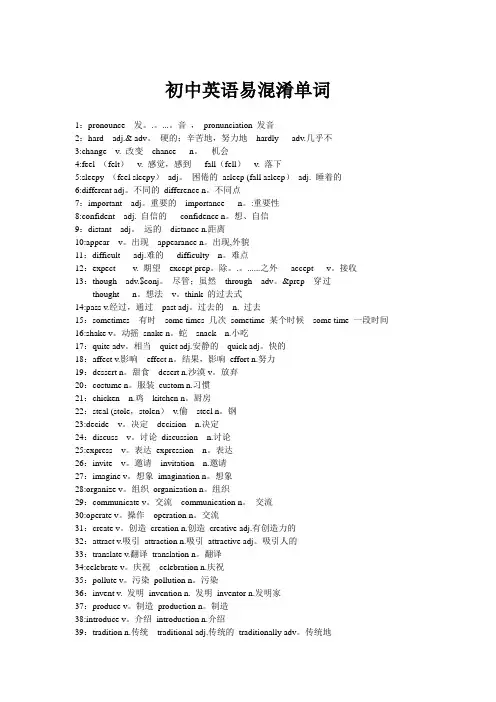
初中英语易混淆单词1:pronounce 发。
.。
...。
音,pronunciation 发音2:hard adj.& adv。
硬的;辛苦地,努力地hardly adv.几乎不3:change v. 改变chance n。
机会4:feel (felt)v. 感觉,感到fall(fell)v. 落下5:sleepy (feel sleepy)adj。
困倦的asleep (fall asleep)adj. 睡着的6:different adj。
不同的difference n。
不同点7:important adj。
重要的importance n。
:重要性8:confident adj. 自信的confidence n。
想、自信9:distant adj。
远的distance n.距离10:appear v。
出现appearance n。
出现,外貌11:difficult adj.难的difficulty n。
难点12:expect v. 期望except prep。
除。
.。
......之外accept v。
接收13:though adv.$conj。
尽管;虽然through adv。
&prep 穿过thought n。
想法v。
think 的过去式14:pass v.经过,通过past adj。
过去的n. 过去15:sometimes 有时some times 几次sometime 某个时候some time 一段时间16:shake v。
动摇snake n。
蛇snack n.小吃17:quite adv。
相当quiet adj.安静的quick adj。
快的18:affect v.影响effect n。
结果,影响effort n.努力19:dessert n。
甜食desert n.沙漠v。
放弃20:costume n。
服装custom n.习惯21:chicken n.鸡kitchen n。
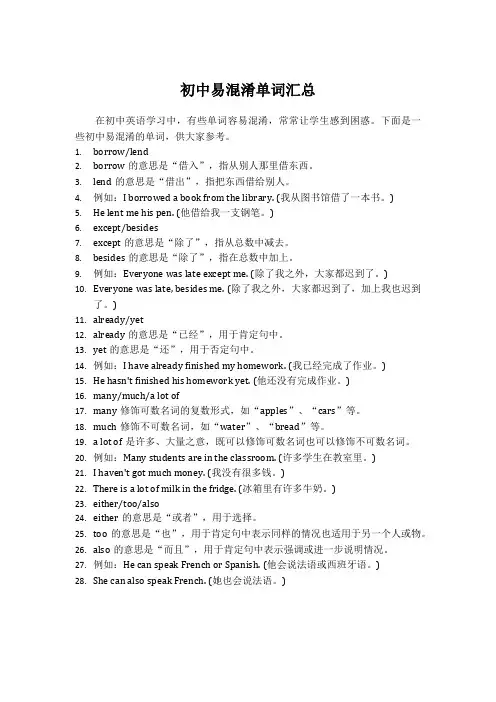
初中易混淆单词汇总在初中英语学习中,有些单词容易混淆,常常让学生感到困惑。
下面是一些初中易混淆的单词,供大家参考。
1.borrow/lend2.borrow的意思是“借入”,指从别人那里借东西。
3.lend的意思是“借出”,指把东西借给别人。
4.例如:I borrowed a book from the library. (我从图书馆借了一本书。
)5.He lent me his pen. (他借给我一支钢笔。
)6.except/besides7.except的意思是“除了”,指从总数中减去。
8.besides的意思是“除了”,指在总数中加上。
9.例如:Everyone was late except me. (除了我之外,大家都迟到了。
)10.Everyone was late, besides me. (除了我之外,大家都迟到了,加上我也迟到了。
)11.already/yet12.already的意思是“已经”,用于肯定句中。
13.yet的意思是“还”,用于否定句中。
14.例如:I have already finished my homework. (我已经完成了作业。
)15.He hasn't finished his homework yet. (他还没有完成作业。
)16.many/much/a lot of17.many修饰可数名词的复数形式,如“apples”、“cars”等。
18.much修饰不可数名词,如“water”、“bread”等。
19. a lot of是许多、大量之意,既可以修饰可数名词也可以修饰不可数名词。
20.例如:Many students are in the classroom. (许多学生在教室里。
)21.I haven't got much money. (我没有很多钱。
)22.There is a lot of milk in the fridge. (冰箱里有许多牛奶。

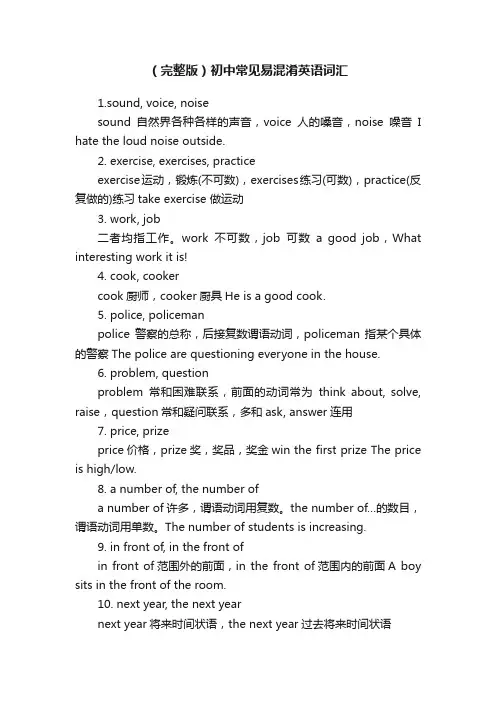
(完整版)初中常见易混淆英语词汇1.sound, voice, noisesound自然界各种各样的声音,voice人的嗓音,noise噪音I hate the loud noise outside.2. exercise, exercises, practiceexercise运动,锻炼(不可数),exercises练习(可数),practice(反复做的)练习take exercise 做运动3. work, job二者均指工作。
work不可数,job可数a good job,What interesting work it is!4. cook, cookercook厨师,cooker厨具He is a good cook.5. police, policemanpolice警察的总称,后接复数谓语动词,policeman 指某个具体的警察The police are questioning everyone in the house.6. problem, questionproblem常和困难联系,前面的动词常为think about, solve, raise,question常和疑问联系,多和ask, answer连用7. price, prizeprice价格,prize奖,奖品,奖金win the first prize The price is high/low.8. a number of, the number ofa number of许多,谓语动词用复数。
the number of…的数目,谓语动词用单数。
The number of students is increasing.9. in front of, in the front ofin front of范围外的前面,in the front of范围内的前面A boy sits in the front of the room.10. next year, the next yearnext year将来时间状语,the next year过去将来时间状语He said he would go abroad the next year.11. in bed, on the bedin bed卧在床上,on the bed在床上The book is on the bed. He is ill in bed.12. the people, a peoplethe people指人,a people指民族The Chinese is a peace-loving people.13. it, oneit同一物体,one同类不同一I lost my pen. I have to buy a new one.14. that, thisthat指代上文所提到的,this导出下文所要说的I was ill. That's why…15. none, nothing, no onenone强调有多少,nothing, no one强调有没有,nothing指物,no one指人--- How many…/How much…? --- None.16. anyone, any oneanyone指人,不能接of,any one指人/物均可,可接of, any one of you17. who, whatwho指姓名或关系,what指职业或地位What is your dad? He is a teacher.18. what, whichwhat的选择基础是无限制的,which在一定范围内进行选择Which do you prefer, bananas or apples?19. other, anotherother后接名词复数,another后接名词单数other students, another student20. many, much, a lot ofmany和可数名词连用,much和不可数名词连用,a lot of可数,不可数均可,但不用于否定句I haven't many books.21. much more…than, many more…thanmuch more…than后接形容词或不可数名词,many more…than后接可数名词many more people, much more water, much more beautiful22. no, notno=not a/any, no friend=not a/any friend, no water=not any water23. by oneself, for oneself, to oneselfby oneself单独的,独自的,for oneself为自己,to oneself供自己用的24. at all, after allat all根本,全然, after all到底,毕竟After all he is a child.25. tall, hightall常指人或动物,high常指物体He is tall.26. fast, quicklyfast侧重于指人或物体具有运动速度快的特点,quickly侧重指某事完成或发生的快run fast, answer the question quickly27. high, highlyhigh具体的高,highly抽象的高,高度的think highly of(高度赞扬)28. sleeping, asleep, sleepysleeping正在睡觉,asleep睡着,熟睡,只能做表语,sleepy困的,有睡意的a sleeping baby,The baby is asleep. I'm sleepy.29. real, truereal真的,真实的,指的是事实上存在而不是想象的,true真的,真正的,指的是事实和实际情况相符合real gold, a true story30. pleasant, pleased, pleasingpleasant常用作定语,pleased常用作表语,pleased主语常为人,a pleasant trip,be pleased with…对…感到满意/开心31. ill, sickill做表语,sick定语、表语均可a sick boy, He is sick/ill.32. good, wellgood形容词,well副词,但指身体状况是形容词He is well again.33. hard, hardlyhard努力,hardly几乎不work hard, I can hardly believe it.34. excited, excitingexcited使人兴奋的,exciting令人兴奋的I'm excited. The news is exciting.35. before long, long beforebefore long不久以后,long before很久以前36. happy, gladhappy高兴,幸福,定表均可,glad高兴,只能做表语a happy girl, I’m happy/ glad to see you.37. instead, instead ofinstead是副词,放在句首或句末,instead of是介词短语,放在句中He didn't see a film. Instead he watched TV. He watched TV instead of seeing a film.38. too much, much tootoo much 后接不可数名词,much too后接形容词much too heavy39. raise, riseraise及物动词,rise不及物动词The sun rises in the east. Raise your hand, please.40. bring, take, carry, fetchbring拿来,take带走,carry随身携带,fetch去回这一往返动作fetch a box of chalk41. spend, take, pay, costspend人做主语,花钱,花时间; s pend…on sth./(in) doing sth; take物做主语,花时间; It takes sb some time to do sth.; pay人做主语,花钱,pay for; cost物做主语,花钱;sth cost some money42. join, join in, take part injoin加入某个组织,并成为其中的一员;join in参加小型的活动, join sb. in;take part in 参加大型的活动He joined the army five years ago.43. learn, studylearn学习,侧重学习的结果,study学习,侧重学习的过程,研究study the problem44. want, hope, wishwant打算,想要,want to do, want sb. to do, hope希望(通常可以实现),hope to do/ hope that… wish希望(通常不能实现)wish (sb.) to do, wish sb/sth. + n. I wish you success.45. answer, replyanswer及物动词,reply不及物动词,后接to, reply to the letter46. leave, leave forleave离开,leave for前往He left Beijing for Shanghai.47. drop, falldrop及物\不及物均可,fall不及物动词Prices fell/dropped. He dropped his voice.48. win, lose, beatwin后接sth.,反义词为lose, beat后接sb. win the game, beat them49. live on, live bylive on以…为主食,live by靠…谋生live on fish/ live by fishing50. catch a cold, have a coldcatch a cold不能和表示"一段时间"的状语连用,而have a cold 可以She has had a cold for a week.51. change for, change intochange for调换成,change into变成Change the shirt for a bigger one. Water changes into ice.52. go for a doctor, go to a doctorgo for a doctor去请医生,go to a doctor去看病53. arrive, get, reacharrive不及物动词,后接in (大地点),at(小地点),get不及物动词后接to,reach及物动词arrive in Beijing, get to Beijing, reach Beijing54. agree with, agree to,agree with同意某人,agree to同意某事,agree with you, agree to the plan, agree to do sth55. receive, acceptreceive收到某一东西,但不一定接受,accept接受I received a gift, but I didn't accept it.56. wear, put on, dresswear和dress表状态,wear接衣服等,可用进行时,dress接人,be dressed in, put on表动作It's cold outside. Put on your warm clothes.57. listen, hearlisten强调动作,hear强调结果I listened, but I heard nothing.58. look, see, watchlook看的动作,see看的结果,watch强调所看物体的变化、移动和发展watch TV59. lie, laylie躺,位于(lay, lain),说谎(lied, lied),lay平放(laid, laid) lay the book60. turn, get, growturn表突变,后常接表颜色的词,get强调变的结果,grow强调过程,逐渐的变化turn yellow, get tired, grow big61. close, shut, turn offclose和shut当关解时可以通用,用于可开合的物体,turn off用于指有开关的物体Close/Shut the door. Turn off the TV.62. at, in (表地点)at小地点,in大地点arrive at a small village, arrive in Shanghai63. day after day, day by dayday after day日复一日(无变化);day by day一天天地(有变化)Trees grow taller day by day.64. after, in (表时间)after接时间点,in接时间段,用于将来时after 7:00, in five minutes65. between, amongbetween两者之间,三者或三者以上两两之间, among三者或三者以上之间Switzerland lies between France, Germany, Australia and Italy.66. through, acrossthrough穿越空间,across在…上穿过through the forest, across the desert67. above, on, overabove在上面,不接触,on在上面,接触,over在正上方fly over the hill68. until, not…untiluntil到…为止,not…until直到…才(常跟点动词连用)I waited until 3:00.He didn't come until 3:00.69. besides, exceptbesides除了…还(包括在内)except除了(不包括在内),70. because, because ofbecause连词,连接两句话,because of后接词或短语He didn't go to school because of his illness.71. for example, such asfor example一般只列举一个,such as列举多个例子I have been to a lot of American cities, such as New York, Atlanta and Chicago.72. All right. That's all right. That's right.All right好吧;That's all right.没关系;That's right. 那是对的---Sorry. --- That's all right.73. such…that, so…that当如此…以至于解时,such…that修饰名词,so…that修饰形容词或副词,但名词前面如果有many, much, little, few修饰用so…that,不用such thatso many people that… such a lovely boy=so lovely a boy74. Shall I…? Will you…?Shall I…? 征求对方意见或向对方请示,意为我能…吗? Will you…?请求或建议对方做某事,意为你愿意…吗? Will you help me? Yes, I will.。
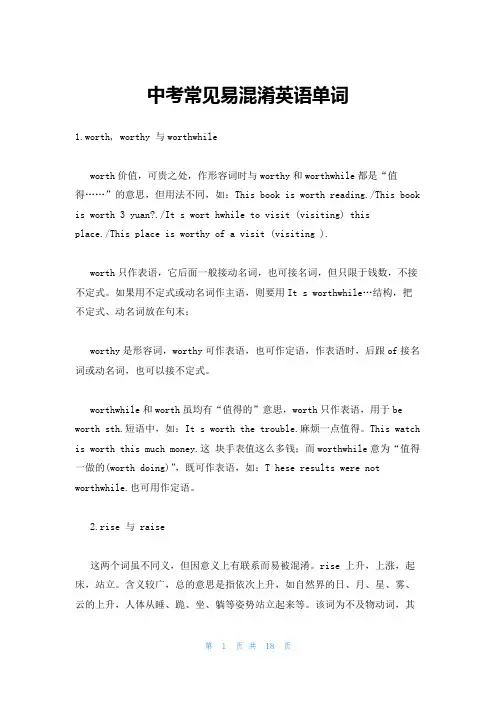
中考常见易混淆英语单词1.worth, worthy 与worthwhileworth价值,可贵之处,作形容词时与worthy和worthwhile都是“值得……”的意思,但用法不同,如:This book is worth reading./This book is worth 3 yuan?./It s wort hwhile to visit (visiting) thisplace./This place is worthy of a visit (visiting ).worth只作表语,它后面一般接动名词,也可接名词,但只限于钱数,不接不定式。
如果用不定式或动名词作主语,则要用It s worthwhile…结构,把不定式、动名词放在句末;worthy是形容词,worthy可作表语,也可作定语,作表语时,后跟of接名词或动名词,也可以接不定式。
worthwhile和worth虽均有“值得的”意思,worth只作表语,用于be worth sth.短语中,如:It s worth the trouble.麻烦一点值得。
This watch is worth this much money.这块手表值这么多钱;而worthwhile意为“值得一做的(worth doing)”,既可作表语,如:T hese results were not worthwhile.也可用作定语。
2.rise 与 raise这两个词虽不同义,但因意义上有联系而易被混淆。
rise 上升,上涨,起床,站立。
含义较广,总的意思是指依次上升,如自然界的日、月、星、雾、云的上升,人体从睡、跪、坐、躺等姿势站立起来等。
该词为不及物动词,其过去式与过去分词分别是rose 和 risen。
例如:The sun rises in the east and sets in the west.日出于东而落于西。
/ Prices rise every day in those countries.那些国家里的物价天天上涨。
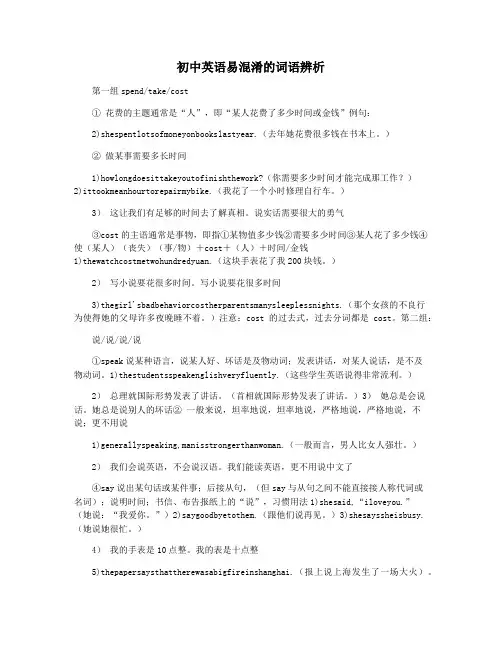
初中英语易混淆的词语辨析第一组spend/take/cost① 花费的主题通常是“人”,即“某人花费了多少时间或金钱”例句:2)shespentlotsofmoneyonbookslastyear.(去年她花费很多钱在书本上。
)② 做某事需要多长时间1)howlongdoesittakeyoutofinishthework?(你需要多少时间才能完成那工作?)2)ittookmeanhourtorepairmybike.(我花了一个小时修理自行车。
)3)这让我们有足够的时间去了解真相。
说实话需要很大的勇气③cost的主语通常是事物,即指①某物值多少钱②需要多少时间③某人花了多少钱④使(某人)(丧失)(事/物)+cost+(人)+时间/金钱1)thewatchcostmetwohundredyuan.(这块手表花了我200块钱。
)2)写小说要花很多时间。
写小说要花很多时间3)thegirl'sbadbehaviorcostherparentsmanysleeplessnights.(那个女孩的不良行为使得她的父母许多夜晚睡不着。
)注意:cost的过去式,过去分词都是cost。
第二组:说/说/说/说①speak说某种语言,说某人好、坏话是及物动词;发表讲话,对某人说话,是不及物动词。
1)thestudentsspeakenglishveryfluently.(这些学生英语说得非常流利。
)2)总理就国际形势发表了讲话。
(首相就国际形势发表了讲话。
)3)她总是会说话。
她总是说别人的坏话② 一般来说,坦率地说,坦率地说,严格地说,严格地说,不说;更不用说1)generallyspeaking,manisstrongerthanwoman.(一般而言,男人比女人强壮。
)2)我们会说英语,不会说汉语。
我们能读英语,更不用说中文了④say说出某句话或某件事;后接从句,(但say与从句之间不能直接接人称代词或名词);说明时间;书信、布告报纸上的“说”,习惯用法1)shesaid,“iloveyou.”(她说:“我爱你。
中考易混淆单词词组汇总一、单词部分。
1. accept [əkˈsept] (v.) - 接受。
- 例句:I accept your invitation.(我接受你的邀请。
)2. except [ɪkˈsept] (prep.) - 除……之外。
- 例句:Everyone is here except Tom.(除了汤姆,大家都在这儿。
)3. alive [əˈlaɪv] (adj.) - 活着的,有生气的(作表语或后置定语)- 例句:The fish is still alive.(这条鱼还活着。
)4. living [ˈlɪvɪŋ] (adj.) - 活着的(可作表语和定语),n. 生活,生计。
- 例句:He is one of the greatest living writers.(他是在世的最伟大的作家之一。
)- 例句:make a living(谋生)5. alone [əˈləʊn] (adj. / adv.) - 单独的(地),独自的(地)(强调独自一人的状态)- 例句:He lives alone.(他独自生活。
)6. lonely [ˈləʊnli] (adj.) - 孤独的,寂寞的(带有感情色彩)- 例句:The old man feels lonely.(这位老人感到孤独。
)7. beside [bɪˈsaɪd] (prep.) - 在……旁边。
- 例句:Sit beside me.(坐在我旁边。
)8. besides [bɪˈsaɪdz] (prep. / adv.) - 除……之外(还有),此外。
- 例句:Besides English, we also learn French.(除了英语,我们还学法语。
)- 例句:I don't like this dress. Besides, it's too expensive.(我不喜欢这条裙子。
它太贵了。
初中英语常见易混词汇辨析在初中英语的学习中,同学们常常会遇到一些容易混淆的词汇,这些词汇在拼写、发音、词义或用法上有相似之处,给我们的理解和运用带来了一定的困难。
下面就为大家详细辨析一些常见的易混词汇。
一、“a”和“an”“a”和“an”都属于不定冠词,用于泛指一个人或事物。
“a”用于以辅音音素开头的单词前,“an”用于以元音音素开头的单词前。
需要注意的是,这里所说的“元音音素”和“辅音音素”指的是读音,而不是字母。
例如,“a book”(一本书),“an apple”(一个苹果)。
“hour”(小时)这个单词虽然以“h”开头,但“h”不发音,它的读音是以元音音素开头,所以应该说“an hour”。
二、“alone”和“lonely”“alone”表示“独自的,单独的”,侧重于指客观上的独自一人,没有同伴。
“lonely”则表示“孤独的,寂寞的”,侧重于指主观上感到孤独、寂寞,带有感情色彩。
例如,“He lives alone but he doesn't feel lonely”(他独自生活,但并不感到孤独。
)三、“bring”和“take”“bring”意为“带来,拿来”,指把某物从别处带到说话者所在的地方。
“take”意为“拿走,带走”,指把某物从说话者所在的地方带到别处。
例如,“Bring your book here”(把你的书带到这儿来。
)“Take this bag to your room”(把这个包拿到你的房间去。
)四、“in front of”和“in the front of”“in front of”表示“在……前面”,指在某个物体外部的前面。
“in the front of”也表示“在……前面”,但指在某个物体内部的前面。
例如,“There is a tree in front of the house”(房子前面有一棵树。
)“The driver is sitting in the front of the bus”(司机坐在公共汽车的前部。
初中英语常用易混词汇辨析汇用法例句above“在……上方”,不一定含有垂直在上的意思。
反义词为:belowThe sun rose above the horizon、太阳升到了地平线以上。
over“在……上面”,含有垂直在上的意思There is a bridge over the river、河上有座桥。
o n“在……上面”,含有与表面相接触的意思There is an oil painting on the wall、墙上有一幅油画。
across/through 词汇用法例句across“横过,穿过”,指从……的一边到另一边Be careful when you walk across the road、当你过马路的时候要小心。
through “穿过”,强调从内部穿过The river flows throughthe city from west to east、这条河从西到东流过城市。
atall/ after all 词汇用法例句at all“全然,根本不”,一般用于否定句中加强语气She doesn’t like football at all、她一点也不喜欢足球。
a fter all“毕竟,终究,到底”,一般置于句首或句末作状语After all, he is a child、毕竟,他还是个孩子。
f ew / a few / little / a little 词汇含义修饰名词肯定/否定例句few几乎没有可数否定I am a new comer here, so I have few friends here、我刚来到这里,所以我在这里没有几个朋友。
a few有一些肯定Though the man has been here for only one month, he has a few friends、尽管这个人才在这里住了一个月,但他就有了一些朋友。
l ittle几乎没有不可数否定There is little water in the glass, so you can’t drink any、杯子里几乎没有水了,你不可能喝到水了。
初中英语易混词汇辨析1.clothes,cloth,clothingclothes统指各种衣服,谓语动词永远是复数cloth指布,为不可数名词clothing服装的总称,指一件衣服用a piece of,an article of2.incident,accidentincident指小事件,accident指不幸的事故He was killed in the accident.3.amount,numberamount后接不可数名词,number后接可数名词a number of students4.sound,voice,noisesound自然界各种各样的声音,voice人的嗓音,noise噪音I hate the loud noise outside.5.photo,picture,drawingphoto用照相机拍摄的照片,picture可指相片,图片,电影片,drawing画的画Let's go and see a good picture.6.weather,climateweather一天内具体的天气状况,climate长期的气候状况The climate here is not good for you.7.road,street,path,wayroad具体的公路,马路,street街道,path小路,小径,way道路,途径take this road;in the street,show me第1/16页the way to the museum.8.course,subjectcourse课程(可包括多门科目),subject科目(具体的学科)a summer course9.custom,habitcustom传统风俗,习俗,也可指生活习惯,后接to do,habit生活习惯,习惯成自然,后接of doing.I've got the habit of drinking a lot. 10.cause,reasoncause指造成某一事实或现象的直接原因,后接of sth./doing sth,reason用来解释某种现象或结果的理由,后接for sth./doing sth.the reason for being late11.exercise,exercises,practice exercise运动,锻炼(不可数),exercises练习(可数),practice(反复做的)练习Practice makes perfect.12.class,lesson作"课"解时,两者可以替换.指课文用lesson.指班级或全体学生用class.lesson6;class513.speech,talk,lecturespeech指在公共场所所做的经过准备的较正式的演说,talk日常生活中的一般的谈话,讲话,lecture学术性的演讲,讲课a series of lecture on…14.work,job二者均指工作。
初中容易搞混的英语单词有很多初中的同学总是搞混英语单词,天天死记硬背但是却一点都记不住,考试的时候脑子一片空白,不怕,小编就太带给容易搞混的英语单词列表,大家可以参考一下。
初中常见的易混词1. abroad到国外go abroadboard板on board2. across 介词,表面穿过 walk across the roadcross 动词 cross the roadthrough 介词,空间穿过 go through the windowpast 介词,经过 walk past the post officepass 动词 pass the test3.alive 活着的 I am still alive.live 现场直播 is covered live居住 live in the citylively 活泼的 make his class lively and interestingliving make a living/ a living room4. lonely孤独 feel lonely孤零零 a lonely housealone独自 live alonealong沿着 walk along the street5. asleep 睡着的 fall asleepsleepy困倦的feel sleepy6. fall 落下,倒 fall downfell :fall的过去式 (fall—fell---fallen)feel 觉得 feel sleepy/tired---过去式felt7. badly---worseJim acted badly, but Tom did worse.well—betterHe plays football well and his father does better.8. boring, interesting, exciting, tiring…修饰物an interesting storybored, interested, excited, tired…修饰人 feel bored9. borrow 借进(以句子主语为参照物)May I borrow your pen?lend 借出(以句子主语为参照物)Could you lend me some money?keep 借一段时间How long can I keep the magazine?10. both两者都 Both of his parents are workers.all 三者以上都 All of my classmates are from China.neither 两者都不 Neither of my hands is clean.none没有一个(三者及以上)None of the four apples is/are red.nothing什么都没有There’s nothing in the fridge.11. care:take care ofcareful 形,仔细的be careful with firecarefully 副,仔细地 listen carefullycareless 形,粗心的 a careless studentcarelessly 副,粗心地drive carelesslycarelessness名,粗心 Your carelessness led to the mistake.12. take 带走(以说话者为中心)remember to take a raincoatbring 带来(以说话者为中心)bring your book herecarry 拿,无方向 Could you help me carry the books?13. close 动词,关闭close the door形,亲密的 my closest friendclosed 形,关着的 keep the door closed14. closely 副,密切地 work closely with us15. brave 形,勇敢的He is brave enough to save the old man.courage 名,勇气have the courage to tell him the bad newsbravely 副,勇敢地face the difficulties bravely16. dead 形,死的 have been deaddie 动,死亡 die of hungerdeath 名,死亡 the death of his pet makes him so sad.17. especially副,尤其 He is good at all subjects, especially maths.specially 副,专门 The pen is specially designed for the boy.special形,特殊的 a special day18. except 除了All the students except Tom will go for a school trip.expect 期待You are expected to bring it back when you return.19. excited形,激动的,修饰人feel excitedexciting形,激动人心的,修饰物 an exciting filmexcitedly 副,修饰人 shouted excitedlyexcitement名shout with excitement20.a little一些,修饰不可数名词 a little moneya few一些,修饰可数名词 a few treeslittle几乎没有,修饰不可数名词There’s little water in the glass, is it?few几乎没有,修饰可数名词 so few students21.form 形成 form a good reading habitfrom 从……22. France 法国/ French 法语German 德国的/ Germany 德国23. hard 努力 work hardhardly 几乎不 The boy hardly does his homework.24. healthy 健康的 keep healthyhealth 健康it’s good for your healthhealthily 健康地 eat healthily25. if 如果主将从现If he comes, I’ll call you.是否I don’t know if he will come here.whether 是否 (如与or连用,则用)I wonder whether he’ll come or not.weather 天气What will the weather be like tomorrow?26.include 动词包括The list includes the names of many famous writers.including 介词They have many pets, including three cats.27. invent 动词发明 Edison invented a lot of things.invention 名词发明 The invention made much difference to humans.inventor 名词发明者 Edison was a great inventor.28. last 上一个的 last year;最后的 make her last apperance动词,持续 The meeting will last one and a half hours.lasting 形,持久的 a lasting value29. lie 名词,谎言 tell a lie动词,说谎 He is always lying to us.动词,位于Japan lies to the east of China.动词,躺,平放 He likes lying on the grass.躺,平放;位于:lie—lay---lain说谎:lie-lied-lied30.luck 名,运气 good lucklucky 形,幸运的a lucky numberluckily 副,幸运的是 Luckily, we got better marks.unlucky/unluckily31. noise名,噪音Don’t make any noise.noisy 形,吵闹的 much too noisynoisily 副,吵闹地 talk noisily32. noise 噪音sound 声音We sat listening to the sound of the waves听起来 The music sounds beautiful.voice 嗓音 The singer has a sweet voice.33. provide 提供provide a chance for the boy=provide the boy with a chance offer :offer a chance to the boy=offer the boy a chance34. other别的,加名词 other studentsanother另一个I don’t like the pair of shoes, would you like to show me another pair?the other 两个中的另一个,常用one…the other Here is a shoe, where’s the other one?others= other+名词35. over/ under 年龄的上下above/ below温度,楼层的上下36. peace名词,和平 love peacepeaceful形,宁静的 a peaceful villagepeacefully 副,和平地we hope to solve the problem peacefully.37. pleasure名,乐意。